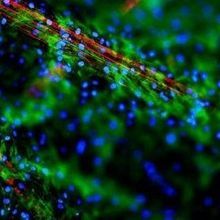 FLICKR, ENGINEERING AT CAMBRIDGEThe US National Institutes of Health (NIH) has outlined a proposal to lift a ban on funding human-animal chimera research—with conditions. “The policy proposes prohibiting the introduction of certain types of human cells into embryos of nonhuman primates, such as monkeys and chimps, at even earlier stages of development than what was currently prohibited,” NPR’s Shots reported today (August 4). Additionally, a committee would review certain experiments that involved, say, human brain tissue.
FLICKR, ENGINEERING AT CAMBRIDGEThe US National Institutes of Health (NIH) has outlined a proposal to lift a ban on funding human-animal chimera research—with conditions. “The policy proposes prohibiting the introduction of certain types of human cells into embryos of nonhuman primates, such as monkeys and chimps, at even earlier stages of development than what was currently prohibited,” NPR’s Shots reported today (August 4). Additionally, a committee would review certain experiments that involved, say, human brain tissue.
Last September, NIH placed a moratorium on research that incorporated human pluripotent stem cells into early-stage animal embryos. Earlier rules from the agency don’t allow for human stem cells to contribute to the germ line of animals.
According to a blog post from Carrie Wolinetz, the associate director for science policy at the NIH, a steering committee would decide whether to fund research in two areas: human stem cells incorporated into nonhuman embryos...
“NIH is seeking public comment on the proposed scope of the chimera research to be considered by the NIH steering committee,” Wolinetz wrote. She added that the agency is also looking to strengthen its ban on breeding animals that have human cells contributing to their brain function and on putting human stem cells into preblastocyst nonhuman primate embryos.
“At the end of the day, we want to make sure this research progresses because it’s very important to our understanding of disease. It’s important to our mission to improve human health,” Wolinetz told NPR. “But we also want to make sure there’s an extra set of eyes on these projects because they do have this ethical set of concerns associated with them.”
Stuart Newman of New York Medical College likened the research to science fiction. “I think that we just can’t say that since it’s possible then let’s do it,” he told NPR.
Members of the public have until September 4 to contribute comments.
Interested in reading more?





